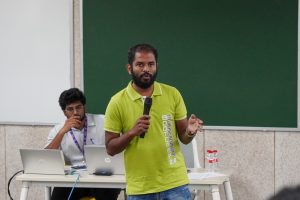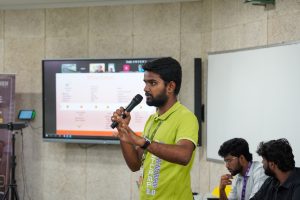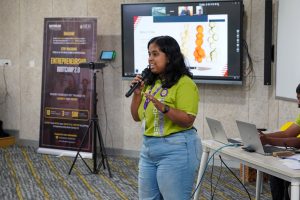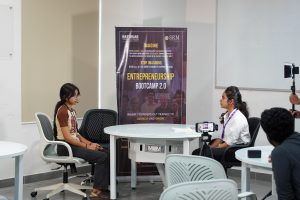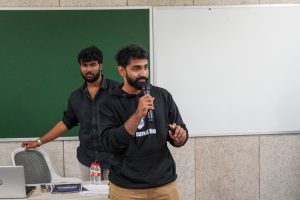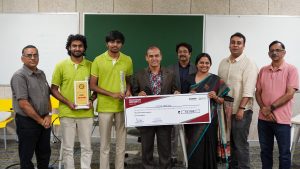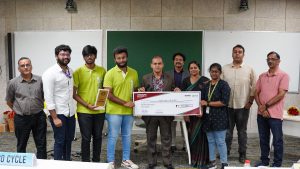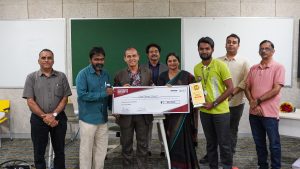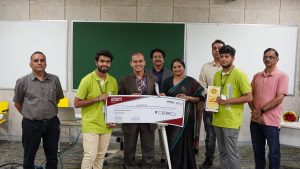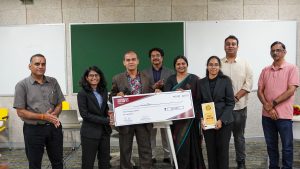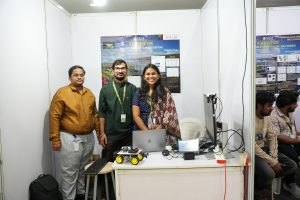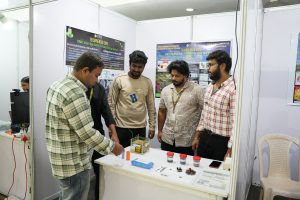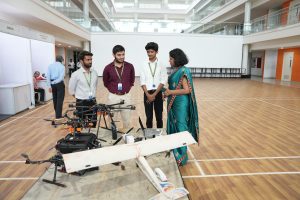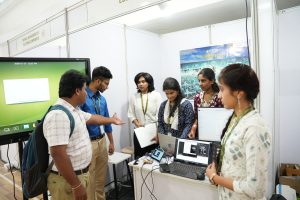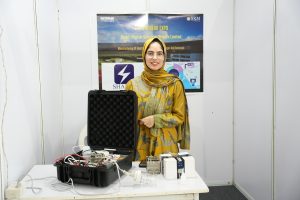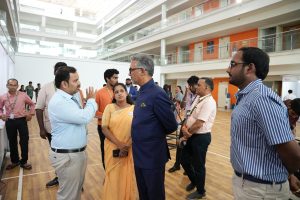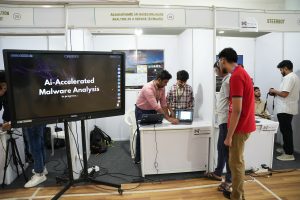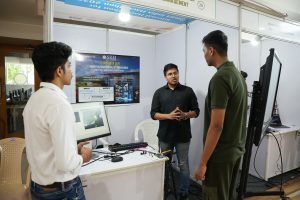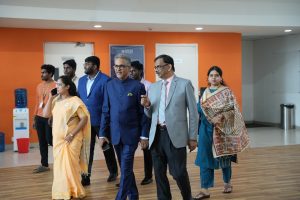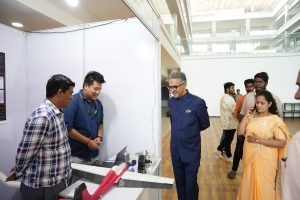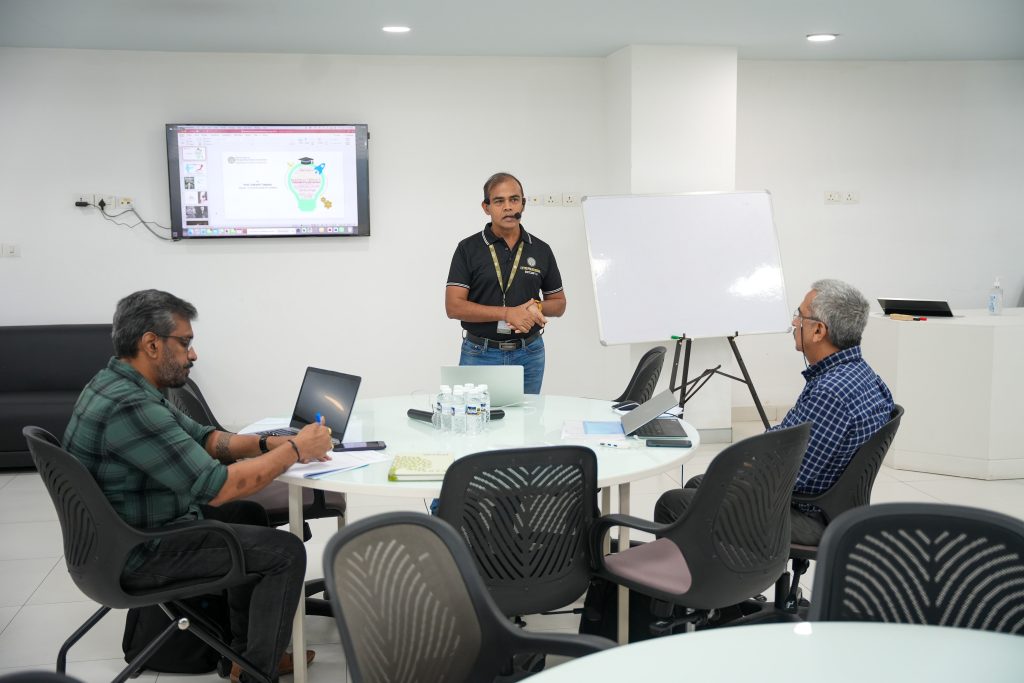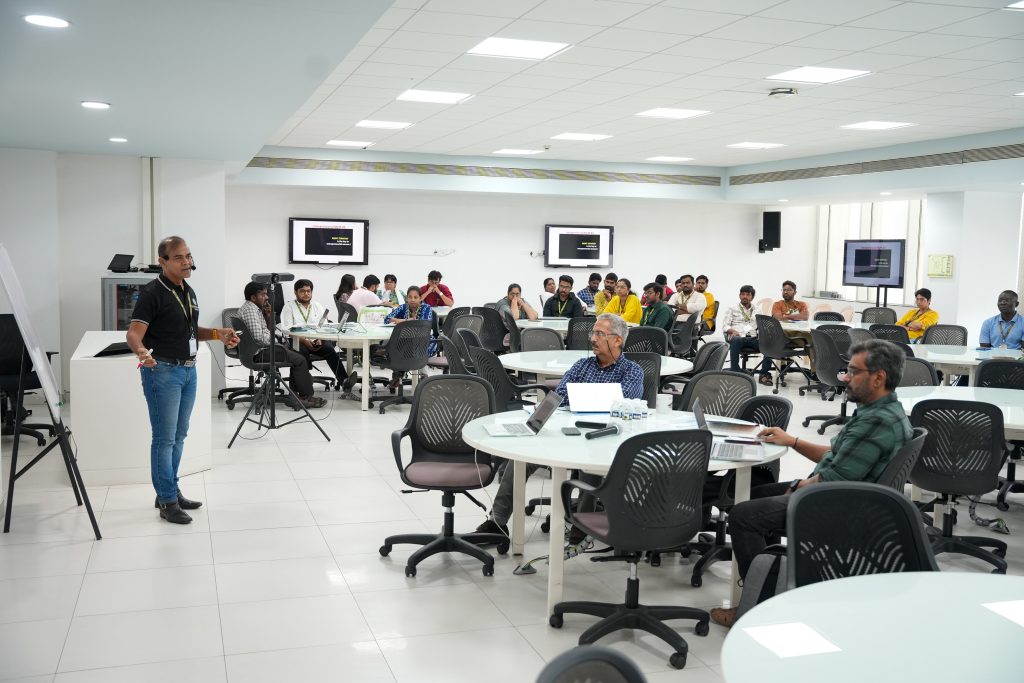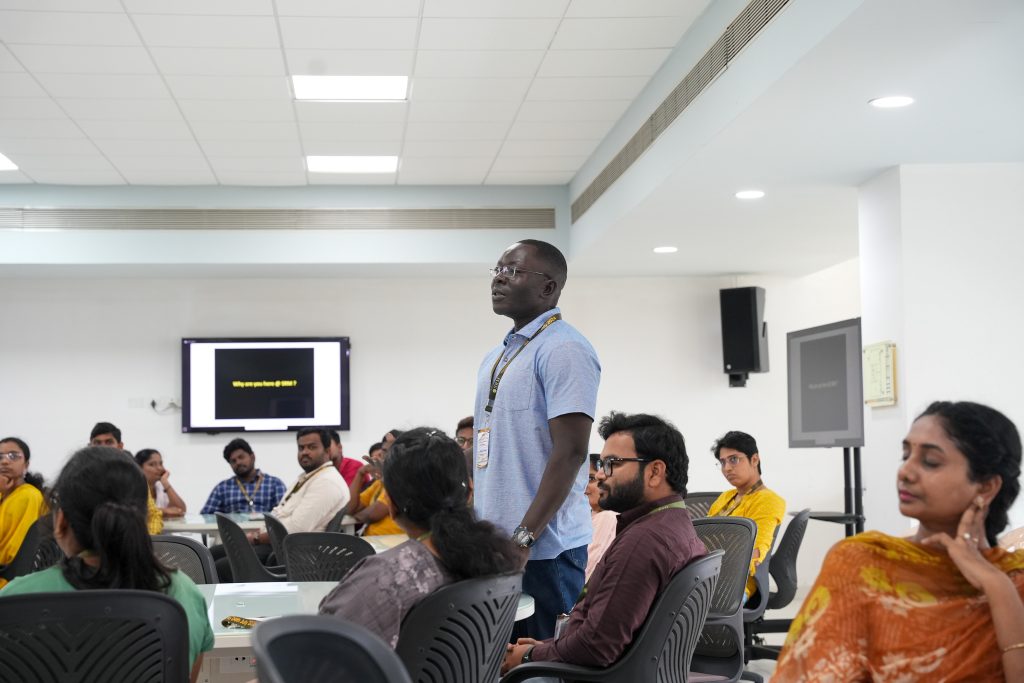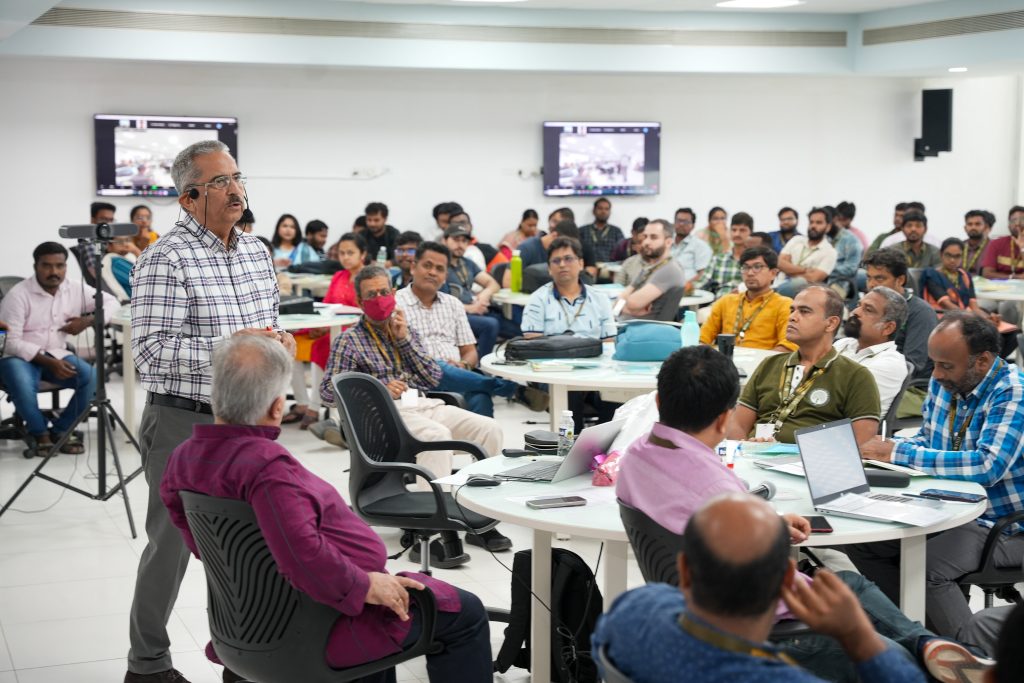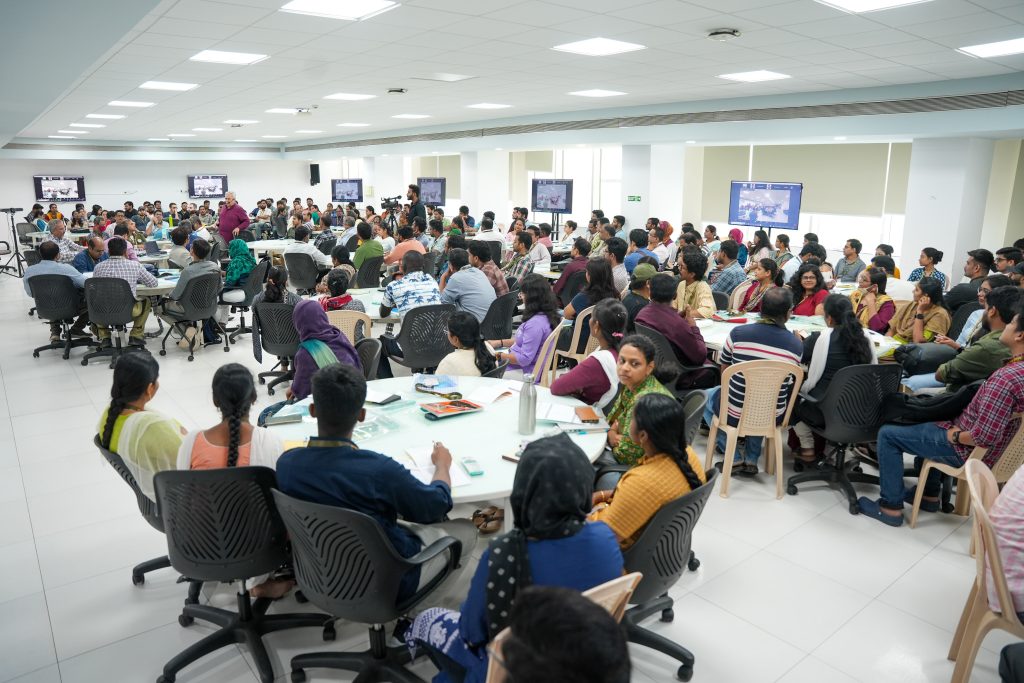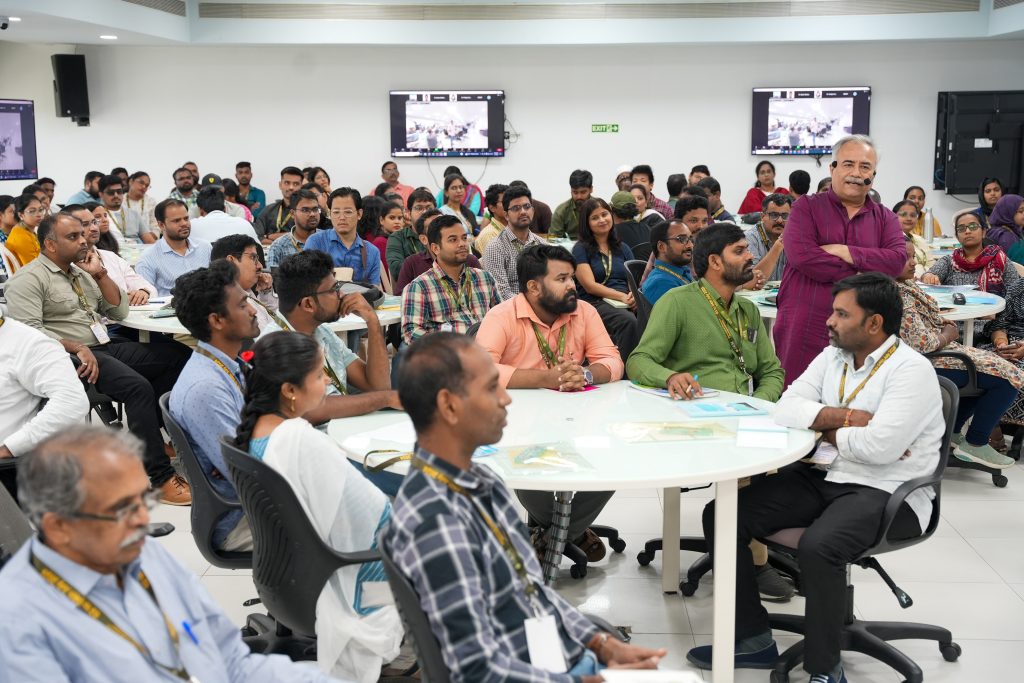Entrepreneurship Bootcamp 2.0: A Journey of Innovation
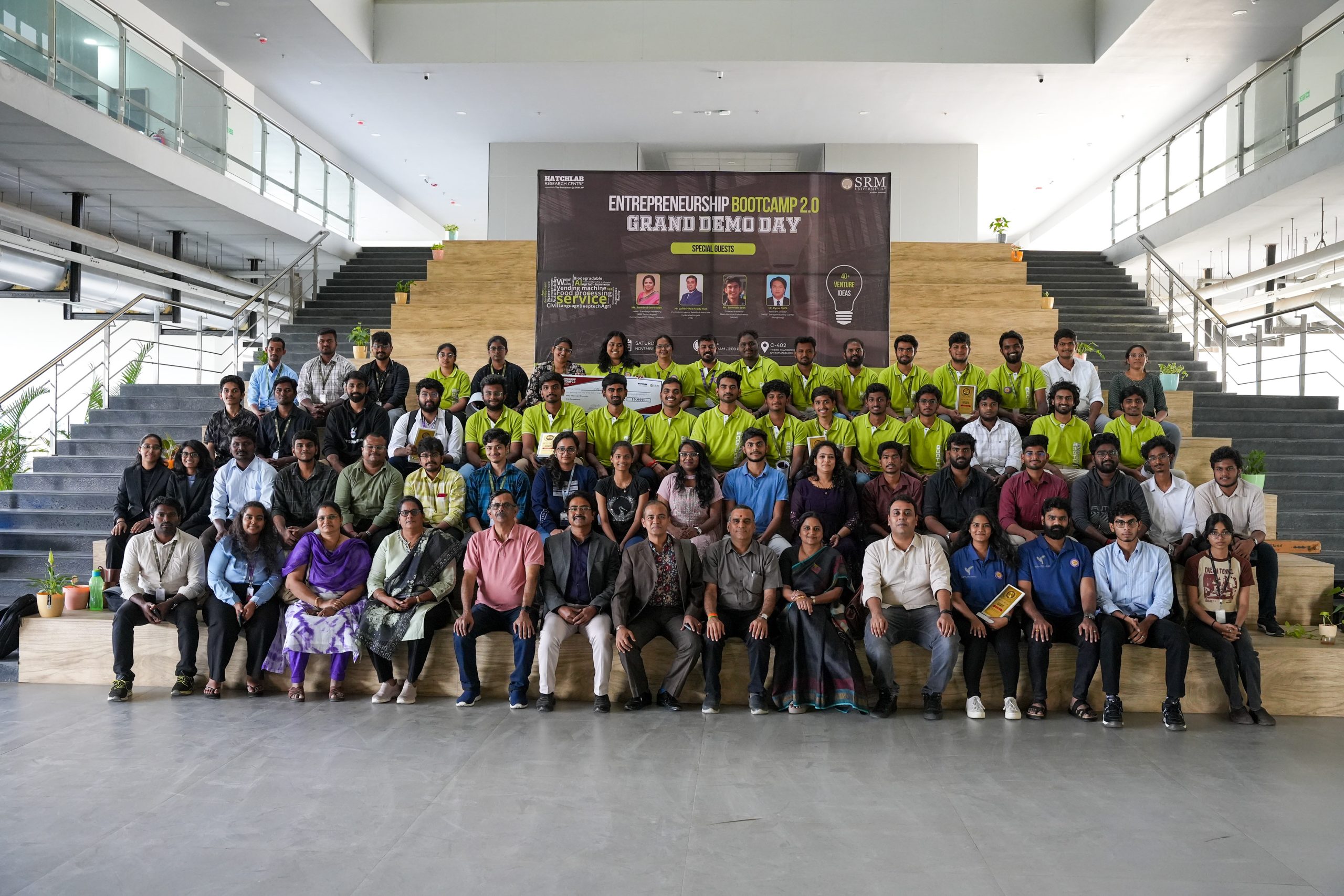 SRM University-AP’s Entrepreneurship Bootcamp 2.0 concluded in style with a vibrant Demo Day, where budding entrepreneurs gathered with innovative ideas, driven by their passion for building successful ventures. The event, held on the university’s Amaravati campus, marked the culmination of a ten-week intensive entrepreneurship training programme designed to foster innovation among students.
SRM University-AP’s Entrepreneurship Bootcamp 2.0 concluded in style with a vibrant Demo Day, where budding entrepreneurs gathered with innovative ideas, driven by their passion for building successful ventures. The event, held on the university’s Amaravati campus, marked the culmination of a ten-week intensive entrepreneurship training programme designed to foster innovation among students.
The Demo Day featured an elite panel of mentors and investors, including Ms Sreedevi Devireddy, Head-Branding & Marketing, ASIP Technologies and Former Head of VDC Gitam University; Mr Cyrus Choi, Assistant Director of the Entrepreneurship Centre at Hong Kong University of Science and Technology (HKUST); Mr Lalith Mitra Reddy Kolli, Portfolio & Investor Relations Associate at Hyderabad Angles; Mr Samridh Seth, Founder, Black Komodo Investments, Dubai along with Prof. Sidharth Tripathy, Director-Entrepreneurship & Innovation, Mr Udayan Bakshi, Associate Director-Entrepreneurship and Innovation, Dr Krovi Raja Sekhar, CEO, Hatchlab Research Centre and Mr Pankaj Belwariar, Director-Communications of SRM University-AP.
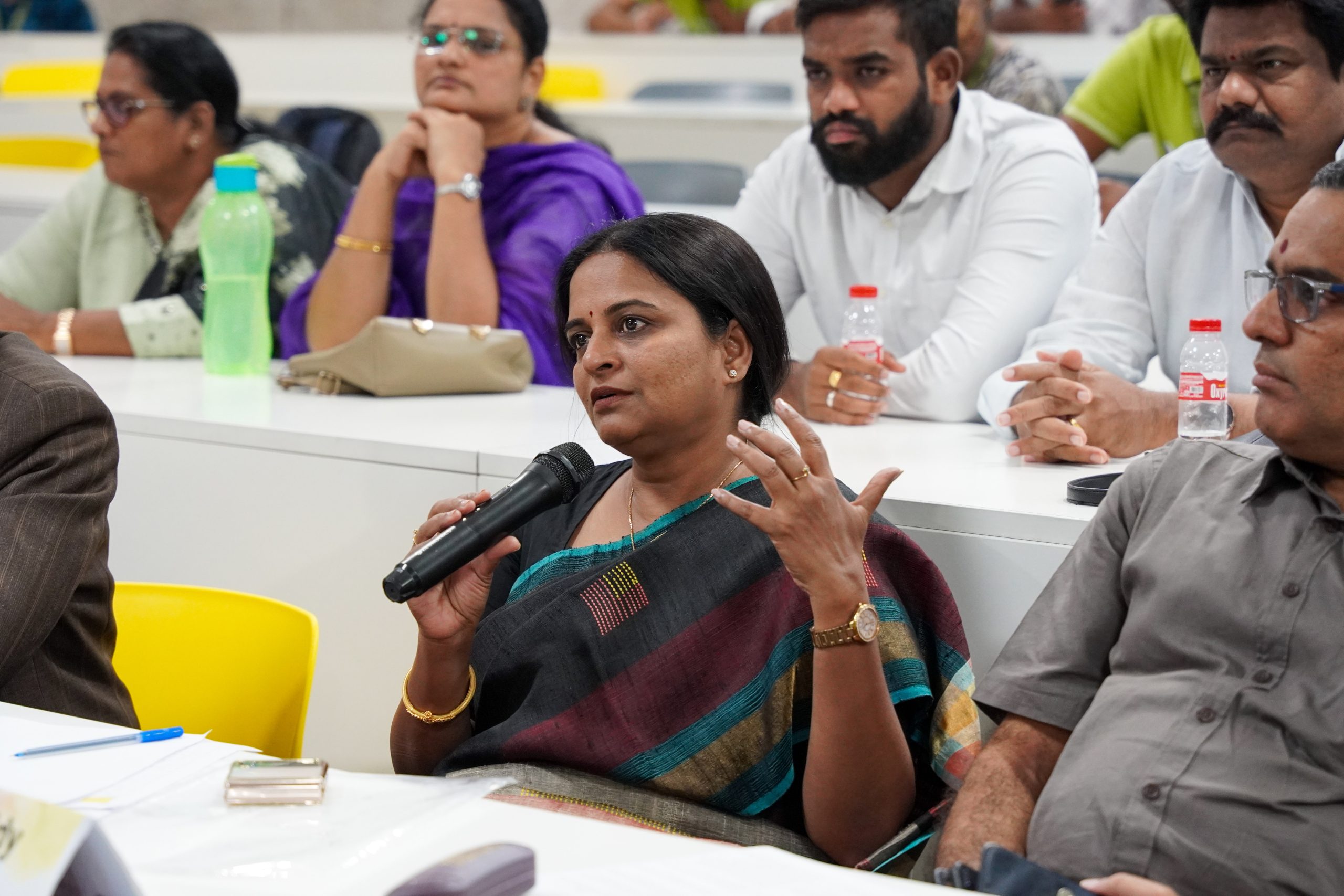 The dynamic presentations by the participants showcased their innovative ideas, business models, and go-to-market strategies. The esteemed panel offered constructive feedback, enabling participants to refine their ventures further. “We approached you as living start-ups, and you rose to the occasion, demonstrating the hunger and drive of true entrepreneurs. Keep that fire alive,” Ms Sreedevi applauded the students.
The dynamic presentations by the participants showcased their innovative ideas, business models, and go-to-market strategies. The esteemed panel offered constructive feedback, enabling participants to refine their ventures further. “We approached you as living start-ups, and you rose to the occasion, demonstrating the hunger and drive of true entrepreneurs. Keep that fire alive,” Ms Sreedevi applauded the students.
The Entrepreneurship Bootcamp 2.0 engaged 85 participants, selected from over 356 applicants after a competitive selection process. Curated by Prof. Sidharth Tripathy, a Harvard alumnus and the Director-Entrepreneurship & Innovation at SRM University-AP, the bootcamp comprised 14 interactive sessions covering ideation, business modelling, and go-to-market planning. The programme included world-class case studies and hands-on mentoring sessions with global experts.
Participants represented ventures in diverse fields such as Waste-to-wealth innovations, Augmented reality, Automobiles, Food processing, AI and Deep tech, Healthcare, Agritech etc. Of the 16 standout ventures identified during the programme, the top 10 teams received incubation grants of ₹50,000 each.
“This event stands as a testament to the passion and dedication of our students. Their hard work has earned them the incubation opportunity that they truly deserve. These grants will support their entrepreneurial journeys through incubation and acceleration at the Hatchlab Research Centre, SRM University-AP’s premier business incubator,” said Prof. Tripathy.
- Published in IDEA NEWS, Innovation, News
Techpreneur Expo-2024: A Grand Showcase of Innovation and Technology
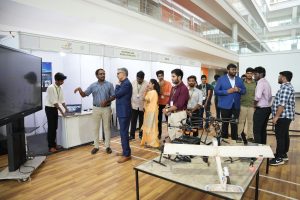 In a significant step forward for innovation and entrepreneurship, the Directorate of Entrepreneurship and Innovation recently organised the highly anticipated Techpreneur Expo-2024. The event, held at SRM University-AP, attracted a host of distinguished guests, including Dr Krish Gopalakrishnan, Co-Founder of Infosys; Mr Rohit Kapoor, CEO of Swiggy; Pro-Chancellor of SRM University-AP, Dr P Sathyanarayanan; Vice Chancellor Prof. Manoj Arora; and Registrar Dr R Premkumar, who lent their support and expertise to this integral gathering.
In a significant step forward for innovation and entrepreneurship, the Directorate of Entrepreneurship and Innovation recently organised the highly anticipated Techpreneur Expo-2024. The event, held at SRM University-AP, attracted a host of distinguished guests, including Dr Krish Gopalakrishnan, Co-Founder of Infosys; Mr Rohit Kapoor, CEO of Swiggy; Pro-Chancellor of SRM University-AP, Dr P Sathyanarayanan; Vice Chancellor Prof. Manoj Arora; and Registrar Dr R Premkumar, who lent their support and expertise to this integral gathering.
The Techpreneur Expo served as a vibrant technical showcase featuring 25 stalls presented by the Department of Next Tech Lab, the Directorate of Entrepreneurship and Innovation, and the Department of Research. Attendees were treated to an impressive array of cutting-edge technologies and projects, ranging from Additive Manufacturing and Bio-Printing to advancements in Robotics and Piezoceramics. Noteworthy projects included Unmanned Aerial Vehicles, IoT applications in Drone Technology, and pioneering RF Frontend Designs for 6G Applications. Environmental sustainability was emphasised through displays on Flexible Solid-State Electrolytes for eco-friendly lithium-ion batteries and the Responsible Management of Electronic Waste, along with initiatives for the Reclamation of Critical Metals aimed at fostering Sustainable Development.
In addition to these advanced technologies, the expo presented innovative projects such as Rechargeable Batteries, Smart Indoor Localization, and Edge AI. Guests and participants had the opportunity to explore the Thermal Management of Electronic Components, Hydrogen Fuel Cells, and Waste Valorization projects that advocate for sustainability. Cutting-edge companies, including SYNC-HAB, SecEn Semiconductors & Test Solutions, and Shakti Photon Solutions Private Limited, showcased their contributions to technology solutions. Moreover, unique offerings like Smart Automation and Self-Optimised Clean Energy Systems, No Wait (a smart solution for lift management), and AI-driven initiatives like ResuMatch for resume mock interviews and AdamantiumRE for malware analysis highlighted the inventive spirit of the event.
Throughout the expo, the esteemed guests visited each stall, commending the quality of the displays and the depth of innovation demonstrated by the students. The event proved to be a resounding success, providing invaluable insights and learning opportunities for students while fostering an atmosphere of collaboration and entrepreneurial spirit within the tech community.
The Techpreneur Expo-2024 not only spotlighted the remarkable talents of budding entrepreneurs and innovators but also set the stage for future advancements in technology, signalling a bright horizon for entrepreneurship and innovation in the region.
- Published in CR&CS Webinars, Departmental News, IDEA NEWS, Innovation, News
SRM AP’s Hatchlab Research Centre Selected as Implementation Agency for GENESIS Scheme
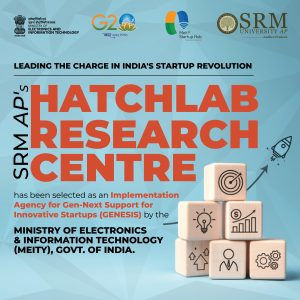 The Directorate of Entrepreneurship and Innovation is thrilled to announce that the Hatchlab Research Centre (HRC), the Technology Business Incubator at SRM University-AP, has been chosen as the Implementation Agency for the “Gen-Next Support for Innovative Startups (GENESIS)” initiative. This decision, made by the Ministry of Electronics & Information Technology (MeitY), Government of India, marks a significant milestone for HRC and highlights its commitment to fostering innovation and entrepreneurship.
The Directorate of Entrepreneurship and Innovation is thrilled to announce that the Hatchlab Research Centre (HRC), the Technology Business Incubator at SRM University-AP, has been chosen as the Implementation Agency for the “Gen-Next Support for Innovative Startups (GENESIS)” initiative. This decision, made by the Ministry of Electronics & Information Technology (MeitY), Government of India, marks a significant milestone for HRC and highlights its commitment to fostering innovation and entrepreneurship.
The GENESIS scheme emerges as a strategic umbrella initiative by MeitY aimed at nurturing and supporting startup ecosystems in Tier II and Tier III cities across India. HRC is among the 50 selected implementation agencies tasked with facilitating this vision, backed by a total budgetary allocation of ₹490 crores. This funding will be instrumental in providing vital resources and infrastructure for startups, ensuring they have the necessary support to thrive in a competitive landscape.
Prof. Sidharth Shankar Tripathy, Director of Entrepreneurship & Innovation of SRM AP, said, ” This announcement is a tribute to the soaring entrepreneurial spirit that is visible among the students, faculty and even the staff of our young entrepreneurial university. What makes this achievement even more special is that it was announced at an appropriate juncture time when SRM University-AP had declared the academic year 2023-24 as the “Year of Entrepreneurship & Innovation.With this new responsibility, we look forward to contributing to the success of startups and innovators across India!”
The HRC’s selection comes at a fortuitous time, as SRM University-AP has declared the 2023-24 academic year to be the “Year of Entrepreneurship & Innovation.” This initiative aims to foster a culture of creativity and entrepreneurial spirit among students, providing them with the tools and support needed to transform their ideas into viable business ventures.
The GENESIS scheme is designed to enhance the startup ecosystem in smaller cities, enabling entrepreneurs outside of metropolitan areas to access essential services, mentorship, and funding opportunities. By selecting HRC as an implementation partner, MeitY acknowledges the centre’s potential to drive impactful change and support innovative startups in the region.
As HRC embarks on this new journey, it promises to create a robust framework that encourages collaboration, knowledge sharing, and the development of sustainable business models among emerging entrepreneurs. The centre will facilitate various programs, workshops, and resources designed to equip startups with the skills, network, and funding requisite for success.
With this prestigious recognition, SRM University-AP’s Hatchlab Research Centre is poised to play a pivotal role in transforming the entrepreneurial landscape, paving the way for a more inclusive and diverse startup ecosystem across the nation.
- Published in Departmental News, IDEA Events, IDEA NEWS, Innovation, News
Enhancing Visual Saliency in Group Photographs: A Novel Approach for Improved Security and Healthcare Applications
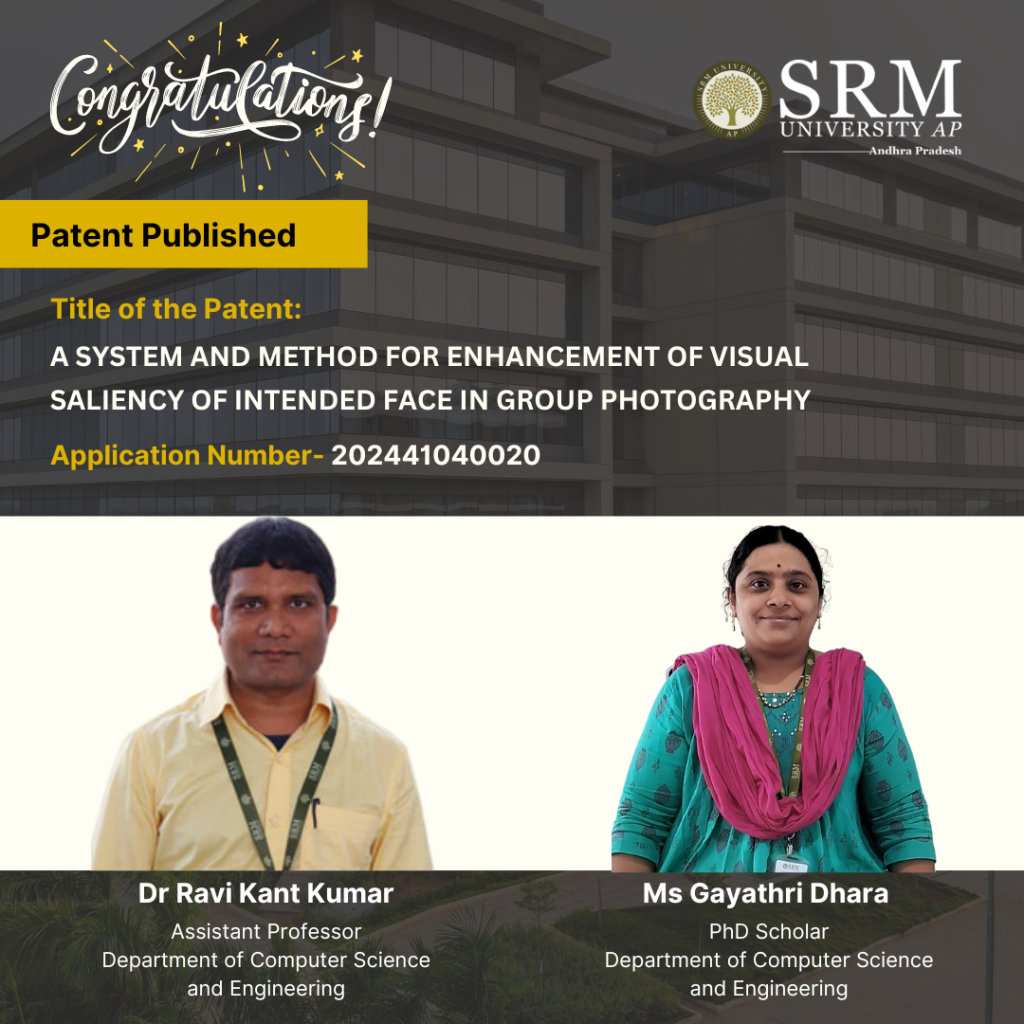
Dr Ravi Kant Kumar, an Assistant Professor at the Department of Computer Science and Engineering, and his research scholar, Ms Gayatri Dhara, have come up with a patent titled “A System and Method for Enhancement Of Visual Saliency Of Intended Face In Group Photography.” The patent, with Application Number 202441040020, employs pathbreaking technology to enhance security and healthcare applications, with real-time face recognition and remote diagnostics.
Abstract:
Visual saliency is a way of figuring out which parts of a scene draw our attention the most. When looking at a crowd or a group of faces, our eyes naturally focus more on certain faces than others. This happens because some faces have dominant features that stand out more. For faces that don’t naturally catch our attention, there is a need to make them more noticeable. This new method and system are designed to do just that. The system calculates scores based on various factors like skin tone, colour, contrast, position, and other visual details. These scores help identify which face needs enhancement, making it more prominent in a group of faces. The primary advantage of this invention is its potential to improve user experience in various applications, such as photo editing, social media, security systems, and more. By giving users, the control to select and enhance a specific face, it allows for a more personalised and targeted approach to face recognition and enhancement. This could be particularly beneficial in scenarios where the user wants to highlight a specific individual in a group photo or in a crowd. Overall, this invention represents a significant advancement in the field of face recognition and image enhancement, offering a novel and user-centric approach to visual saliency. It opens up new possibilities for user interaction and control in image editing and face recognition technology.
Practical and Social Implications
The practical implementation of this research lies in its ability to identify and enhance faces within a group or crowd that do not naturally draw attention. This innovative method and system address this issue by calculating saliency scores based on factors such as skin tone, colour, contrast, position, and other visual details. These scores are then used to identify faces that need enhancement to become more prominent in a group. The system’s ability to enhance specific faces has significant practical applications in several fields.
Photo Editing: Users can easily enhance specific individuals in group photos, ensuring that everyone stands out as desired. This is particularly useful for personal photos, event photography, and professional photo editing.
Social media: Enhanced face recognition and saliency can improve user experience by allowing users to highlight specific people in their posts, making photos more engaging and personalised.
Security Systems: In surveillance and security applications, the ability to enhance less prominent faces can improve the accuracy of face recognition systems, aiding in the identification of individuals in crowded or low-visibility conditions.
Collaborations:
SRM University-AP,
Dr Ravi Kant Kumar,
Mrs Gayathri Dhara.
Future Research Plans:
Future plans for this visual saliency-based face enhancement system include refining algorithms for greater accuracy and efficiency, and integrating with popular photo editing software and social media platforms for seamless user experience. The technology will be expanded into security and healthcare applications, enhancing real-time face recognition and remote diagnostics. Emphasis will be placed on reducing biases, ensuring privacy protection, and enabling user customisation. Collaborations with academic institutions will drive further research, while commercialisation efforts will focus on launching products globally.
- Published in CSE NEWS, Departmental News, News, Research, Research News
Research to Revenue: 3-day Workshop Concludes
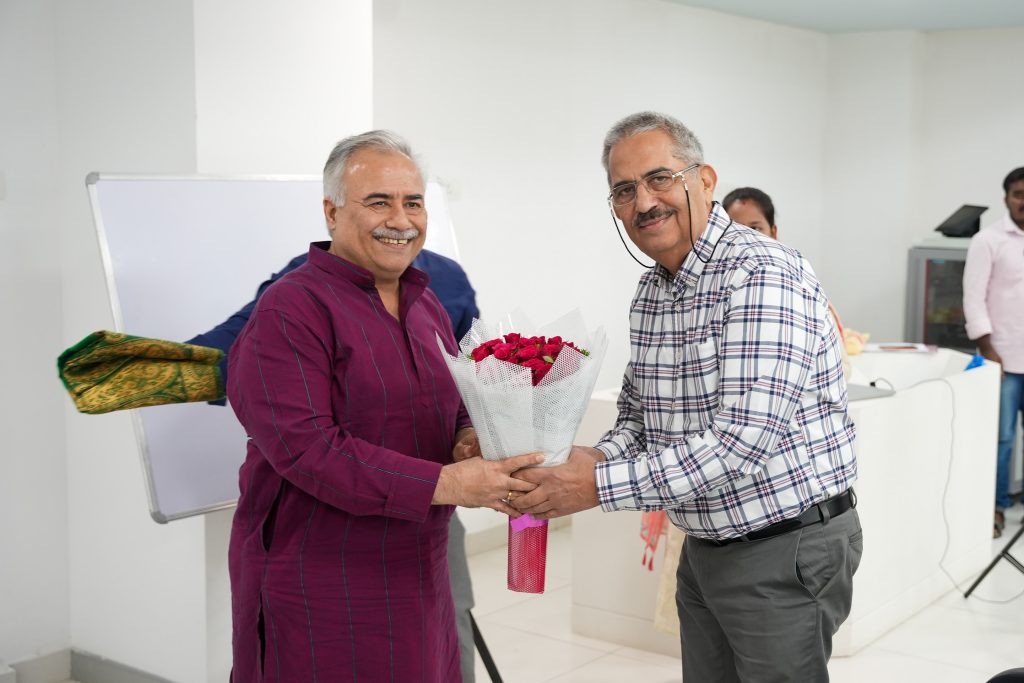 The Office of the Dean-Research and IPR Cell at SRM University-AP hosted a highly impactful 3-day Workshop on “Research Commercialisation.” The workshop was graced by industry expert Mr Rakesh Sharma, a leading figure in business restructuring and global marketing. Mr Sharma with his notable experience of 38 years at Philips, imparted valuable insights on innovation, venture development, and commercialisation.
The Office of the Dean-Research and IPR Cell at SRM University-AP hosted a highly impactful 3-day Workshop on “Research Commercialisation.” The workshop was graced by industry expert Mr Rakesh Sharma, a leading figure in business restructuring and global marketing. Mr Sharma with his notable experience of 38 years at Philips, imparted valuable insights on innovation, venture development, and commercialisation.
The workshop was attended by faculty and research scholars, all keen on understanding the intricacies of research commercialisation. The inaugural ceremony of the workshop was highlighted by the felicitation of Mr Sharma by the Vice Chancellor, Prof. Manoj K Arora, along with Prof. Ranjit Thapa, Dean—Research; Deans of the three schools; Prof. G S Vinodkumar, Coordinator—IPR Cell & Convenor of this workshop; and other senior faculty members.
In his address, Prof. Manoj K Arora underscored the critical role of research, he urged the attendees to “think differently and change your mindset to unlock the boundless potential of your research and innovation.” He engaged with faculty and research scholars, seeking their perspectives. Prof. Ranjith Thapa, the Dean of Research, presented an overview of the varsity’s research capabilities, spotlighting its achievements in Q1 publications and patents across different departments.
Day 1– The workshop kicked off with Mr Sharma encouraging participants to voice their queries and concerns about commercialisation. Key discussion points covered included linking university research with practical applications, the transformation of patents and research into industry-ready products, understanding market needs, fundraising for research projects, and leveraging humanities and liberal arts in patent implementation. Mr Sharma engaged with each of the queries and closely explained to the students with simple and easy-to-understand examples, thereby making the session worthwhile and interesting.
Day 2—Scholars had the opportunity to present their published and granted patents. They received constructive feedback from faculty and Mr Sharma and understood how these patents could be further developed for commercialisation, thereby leading to fruitful discussions on improving and materialising these ideas.
Day 3– A significant outcome of the workshop was the proposal to establish a new centre for research commercialisation designed to offer students an in-house pathway to commercialise their patents. This initiative received widespread acclaim from all participants and sparked engaging discussions about transforming research into viable business ventures, facilitated by the session by the Director of Entrepreneurship and Innovation, Mr Sidharth Shankar Tripathy.
The workshop offered a crucial platform for students, offering both inspiration and guidance in their pursuit of entrepreneurship. The event was specifically designed for all PhD Scholars who are currently working on their research papers and looking for ways to commercialise their innovative ideas, projects, or inventions.
Through a series of expert-led sessions, interactive discussions, and networking opportunities, students were encouraged to think critically about their project’s potential impact, market readiness, and the pathways to achieving sustainable business growth.
- Published in News, Research, Research News, Research Workshop, Workshop
Decoding BSc Mathematics with Subjects That Shape Your Career
BSc Mathematics is a comprehensive programme that offers a deep dive into various subject areas, shaping students’ understanding and expertise in the field of mathematics. Each subject plays a crucial role in developing analytical thinking and problem-solving skills, from foundational topics like calculus, algebra, and geometry to advanced areas such as differential equations, probability theory, and mathematical modelling.
As students progress through the curriculum, they encounter specialised BSc Mathematics subjects like fundamental analysis, complex analysis, and numerical methods, further enhancing their mathematical prowess.
Moreover, elective courses allow students to tailor their education to their interests and career aspirations, whether in pure mathematics, applied mathematics, or another specialised field. By navigating through these subjects, BSc Mathematics students gain a well-rounded education that prepares them for various career paths in academia, research, finance, data analysis, and beyond.
BSc Mathematics Subjects List
The subjects typically included in a BSc Mathematics programme may vary slightly depending on the university or college offering the course. However, some common subjects that are often part of the BSc Mathematics curriculum include:
- Calculus
- Algebra
- Geometry
- Differential Equations
- Probability Theory
- Statistics
- Real Analysis
- Complex Analysis
- Linear Algebra
- Number Theory
- Discrete Mathematics
- Numerical Methods
- Mathematical Modelling
- Operations Research
- Mathematical Physics
These subjects provide a comprehensive understanding of various mathematical concepts and their applications in different fields.
Year-wise BSc Mathematics Syllabus:
BSc Mathematics syllabus 1st year
Semester 1:
- Art of Listening, Speaking and Reading Skills
- Environmental Science
- Analytical Reasoning and Aptitude Skills
- Chemical Basis of Life
- Mathematics for the Physical World
- Fundamentals of Computing
- Emerging Technologies
Semester 2:
- Effective Writing and Presentation Skills
- Universal Human Values and Ethics
- Entrepreneurial Mindset
- Principles of management
- Psychology for Everyday Living
- Real Analysis
- Linear algebra
BSc Mathematics syllabus 2nd year
Semester-3
- Problem-Solving Skills
- Co-Curricular Activities
- Community Service and Social Responsibility
- Digital literacy
- Discrete Mathematics and Combinatorics
- Real Analysis -2
- Ordinary Differential Equation -1
- Algebra – 1 (Group Theory)
Semester-4
- Creativity and Critical thinking Skills
- Co-Curricular Activities
- Community Service and Social Responsibility
- Mathematical Modelling of Physical Data
- Complex Analysis
- Probability and Statistics
- General Topology
BSc Mathematics syllabus 3rd year
Semester-5
- Co-Curricular Activities
- Community Service and Social Responsibility
- Linear Programming Problem
- Real Analysis – 3
- Partial Differential Equations-1
- Numerical Analysis
- Number Theory and Introduction to Cryptography
Semester-6
- Co-Curricular Activities
- Community Service and Social Responsibility
- MATLAB, Sage and Mathematical
- Measure Theory (For Pure and Applied Math)/ Data Structures and Algorithms (For Data Science and Industrial Mathematics)
- Algebra-2 (For Pure Math/ Mechanics and Tensor Calculus (For Applied Math/ Applied Statistics (For Data Science and Industrial Mathematics)
BSc Mathematics syllabus 4th year
Semester-7
- Algebra -3 (Galois Theory) (for Pure Math)/ PDE – 2 (For Applied Math)/ Regression analysis (for Data Science and Industrial Mathematics)
- Operator Theory (For Pure Math)/ Dynamical Systems (For Applied Math)/ Stochastic process and Stochastic Differential Equations (For Data Science and Industrial Mathematics)
Semester-8
Internships and Research Projects
Jobs After BSc Mathematics
After completing a BSc Mathematics degree, graduates have a wide range of career opportunities available to them across various industries. Some common career paths for BSc Mathematics graduates include:
● Data Analyst
● Actuary
● Statistician
● Financial Analyst
● Operations Research Analyst
● Software Developer
● Market Research Analyst
● Teacher or Lecturer
● Risk Analyst
● Cryptographer
These are just a few examples of the diverse career paths available to BSc Mathematics graduates. The analytical, problem-solving, and critical thinking skills acquired during their studies make them valuable assets in a wide range of industries.
Shape Your Tomorrow with Numbers with B.Sc. Mathematics (Hons.) at SRM University-AP
The School of Engineering and Sciences at SRM University-AP offers B.Sc. Mathematics (Hons.) is a four-year undergraduate mathematics programme. Upon B.Sc. completion, students can seamlessly pursue PhDs domestically and internationally. The curriculum features robust foundational math courses alongside minors and open electives. From the sixth semester, students can specialise in three fields:
- Pure Mathematics,
- Applied Mathematics, and
- Data Science and Industrial Mathematics.
B.Sc. Mathematics (Hons.) Programme Highlights:
A diverse range of electives encompassing four advanced discipline-specific options. An undergraduate thesis project aimed at enhancing students’ mathematical abilities and facilitating admission to prestigious graduate programmes in the US and Europe.
Dedicated faculty provide personalised guidance and supervision for each undergraduate thesis.
The meticulously crafted curriculum instils confidence in students to excel in national and international-level mathematics competitive exams such as GRE, CSIR NET, NBHM, GATE, JAM, TIFR, ISI, CMI, etc.
Students specialising in Data Science and Industrial Mathematics will receive comprehensive industry-oriented training.
Long Story Short:
Mathematics continues to be a fundamental discipline with widespread applications across various industries and sectors. With the increasing demand for skilled professionals adept in mathematical concepts and techniques, pursuing a B.Sc. Mathematics (Hons.) degree opens doors to numerous rewarding career opportunities.
SRM University-AP offers a comprehensive programme that equips students with the knowledge and skills necessary to excel in this dynamic field. Join it in shaping the future of mathematics and embark on a fulfilling academic journey that will prepare you for success in the ever-evolving world of mathematics and beyond. Take the first step towards a promising career by enrolling in B.Sc. Mathematics (Hons.) at SRM University-AP today!
- Published in Academics, Admissions, Blog, Engineering, Math Blog, Sciences
Journey Through Time: Discovering BA History Course Details
Unearthing Histories: Explore BA History Course Details
History is the majestic tapestry upon which humanity paints its legacy. It’s a canvas woven with tales of triumphs, conflicts, and the evolution of societies. Studying history isn’t merely peering into the past; it’s an odyssey through the corridors of time, a journey that unveils the secrets of civilisations and the threads that connect the present to the bygone eras. It’s the cornerstone of understanding our world’s complexities. It is a multidimensional exploration that dissects the past through diverse lenses.
A Bachelor of Arts (BA) in History is an undergraduate degree programme focusing on the study of the past, exploring events, societies, cultures, and their evolution over time. Typically, it involves coursework covering various periods, regions, and themes in history. This course is a gateway to unravelling the mysteries of culture, power, and human behaviour, illuminating pathways to comprehend the present and shape the future. Also, it provides a foundation for various career paths, as mentioned earlier, by cultivating transferable skills highly valued in multiple sectors.
Moreover, movie houses have a high demand for history experts who can conduct research on costumes, jewellery, and movie sets. Collaborating closely with directors and cinematographers, these experts may also pursue roles as research analysts in production houses. Let’s dive into BA History course details.
BA History Course Details
BA History Eligbility:
The typical eligibility requirements for a Bachelor of Arts (BA) in History include:
- Completion of 10+2 or an equivalent from a recognized board like CBSE or ICSE
- Attainment of at least 50% aggregate marks in the qualifying examination
- Acceptance of students from any academic stream into the BA History program
- Some universities might stipulate prior study of History at the 10+2 level.
Preference is often given to candidates from a Humanities background. Individual institutes may have unique eligibility criteria. For instance, DU Admissions mandates that applicants have passed Mathematics at the qualifying level.
BA History Duration:
The BA History programme spans three years and delves into the evolution of human civilization across ancient to modern eras. Exploring diverse cultures, it scrutinizes both the accomplishments and shortcomings, unravelling the tapestry of achievements and setbacks throughout history.
Jobs After BA History
A BA in History can open doors to various career paths due to the skills it develops, such as critical thinking, research, analysis, and communication. Some career options include:
- Museum Curator/Archivist
- Historical Researcher
- Education
- Journalism/Writing
- Government & Public Service
- Librarian
- Heritage Manager
- Consultancy/Analysis
Many careers might require further education, specialized training, or internships. Consider supplementing your BA with internships, certifications, or even pursuing higher education like a Master’s or Ph.D. in History or related fields to enhance your prospects in certain career paths.
BA (Hons) in History at SRM University-AP – Nurturing Legacy Explorers
The School of Liberal Arts and Social Sciences at SRM AP presents a BA (Hons.) in History, aiming to provide students with comprehensive knowledge of global and Indian history. The programme challenges the conventional view of history as a mere chronicle of dates and personalities.
Emphasizing diverse perspectives on historical events encourages critical thinking and analysis. Through intensive reading and tutorial sessions, students engage deeply with historical texts, fostering a nuanced understanding. Evaluation at SRM University-AP emphasizes presentations, ensuring a dynamic and insightful exploration of the multifaceted nature of history.
BA History Subjects List at SRM University-AP
Semester 1:
• Art of Listening, Speaking, and Reading Skills
• Environmental Science
• Digital Literacy
• Understanding Indian Society(ies): Myths and Realities
• Understanding the Indian Constitution
• Understanding Human Minds
• Emerging Technologies
Semester-2:
• Effective Writing and Presentation Skills
• Universal Human Values and Ethics
• Analytical Reasoning and Aptitude
• Economics in Everyday Life
• Data Analytics for Social Sciences
• Human Civilizations
Semester-3:
• Creative and Critical Thinking Skills
• Co-Curricular Activities
• Community Service and
• Social Responsibility
• Entrepreneurial Mindset
• Middle Ages in Europe
• European Social Formations
Semester-4:
• Leadership and Teamwork
• Community Service and Social Responsibility
• Social Entrepreneurship
• Early Medieval India
• Medieval India (1200-1500)
• History of Central Islamic Lands
• Age of Revolutions and National Liberation
Semester-5:
• Community Service and Social Responsibility
• Career Skills- I
• Medieval India – II
• Introduction to Colonial Latin America and the Caribbean
• Economic History of Modern India (1757-1947)
Semester-6:
• Community Service and Social Responsibility
• Entangled Histories
• Understanding Caste
• Society, Politics, and Economy: India After Independence
• Introduction to Colonial Africa
Semester 7 & 8:
• Seminars and Dissertation
Wrapping Things Up
Take up an illuminating journey through the annals of time with SRM University-AP’s BA (Hons) History programme. The multidimensional curriculum doesn’t just decode the past; it fosters critical thinking and analysis. Join the university to explore diverse perspectives and unveil the rich tapestry of history. Embrace a future shaped by a nuanced understanding of civilizations. Start your transformative journey by applying today.
- Published in Academics, Blog, Liberal Arts


